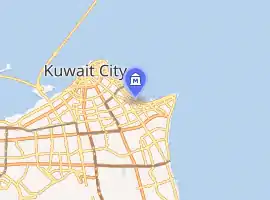Sheikh Abdullah Al-Salem Cultural Centre
The Sheikh Abdullah Al-Salem Cultural Centre (Arabic: مركز الشيخ عبدالله السالم الثقافي) is a cultural complex located in Kuwait City, Kuwait owned by the Amiri Diwan. It consists of six main components; The Natural History Museum, Science Museum, Space Museum, Arabic Islamic Science Museum, Fine Arts Centre and the external spaces known as the Public Realm. The Sheikh Abdullah Al-Salem Cultural Centre is a 18-hectare site making it the world's largest museum complex[1]
مركز الشيخ عبدالله السالم الثقافي | |

| |
| Established | March 14, 2018 |
|---|---|
| Location | Kuwait City, Kuwait |
| Coordinates | 29.343917°N 48.041278°E |
| Type | Cultural Centre |
| Architect | SSH |
| Owner | Amiri Diwan |
| Website | www |
The museum is named after the late Sheikh Abdullah Al-Salem Al-Sabah who was the 11th ruler of Kuwait, the first Amir and the founder of modern Kuwait.
The Sheikh Abdullah Al Salem Cultural Centre creates a new museum district within Kuwait. Together with the Sheikh Jaber Al Ahmad Cultural Centre, the cultural centre is part of the new Kuwait National Cultural District.[2][3]
The museums present Kuwaiti, Islamic, and Arabic culture and history. They also embrace and showcase the rich diversity of the world's finest cultural achievements.[4]
Design
The project was administered by the Amiri Diwan who appointed Kuwaiti Architects SSH to design and engineer the building envelopes and components, which are connected through glazed wings and a canopy acting as the central spine of the cultural centre.
Alghanim International, a local main contractor, were appointed as the builders, tasked with constructing the museum envelopes and undertaking the extensive sitewide landscaping. London-based Cultural Innovations developed the visitor experience design.
Exhibits at the Sheikh Abdullah Al-Salem Cultural Centre cover history, science, space and culture.
The project forms the major part of Kuwait's new national cultural district.
Museums
Natural History Museum
Making up eight of the galleries across the complex, the Natural History Museum (NHM) covers themes including Prehistoric Life, Ecosystems, The Earth and Environment, Biodiversity, Nature, and Arabian Wildlife and Geography.
Within the NHM galleries is a South East Asian rain forest with a combination of living trees and plants interspersed with faux, overlooking a 1.4 million liter aquarium stocked with live species. The 6m x 6m concave end retaining panel together with the side viewing panels weigh over 65 tons providing a full underwater panorama of the aquarium.
The Prehistoric Life gallery includes over 30 full size prehistoric creatures both skeletal and full bodied.
Each museum has a glass clad wing protruding from the end. The Prehistoric Life wing includes a 17 meter-long prehistoric whale suspended above four displays of giant beasts from the distant past.
Science Museum
The Transport gallery houses over 200 historical and contemporary vehicles from full scale planes, boats and cars suspended from the roof structure, to full size replicas of the Bluebird and Bloodhound speed record vehicles and the Red Bull Stratos capsule. The technical installation methodology, coordination and structural challenges were significant within this gallery.
Space Museum
The Space Museum with four galleries and a 110-seat planetarium creates a futuristic museum exploring topics from the Big Bang to space travel, and our place in the solar system. At the centre, the planetarium was designed and built as part of the exhibition fit-out including the structural development and engineering for it to traverse the ground and mezzanine floors. A key section of the museum is an immersive model of the international space station (ISS) which gives the opportunity to learn about astronauts' life in the ISS, and the challenges involved in human living in space.
References
- "Project Profile: Sheikh Abdullah Al Salem Cultural Centre, Kuwait City". Museum ID. July 4, 2018. Retrieved May 16, 2019.
- "Kuwait National Cultural District Museums Director" (PDF). 28 August 2017. Archived from the original (PDF) on 29 August 2017.
- "Kuwait National Cultural District".
- "Sheikh Abdullah Al Salem Cultural Centre". 28 August 2017.